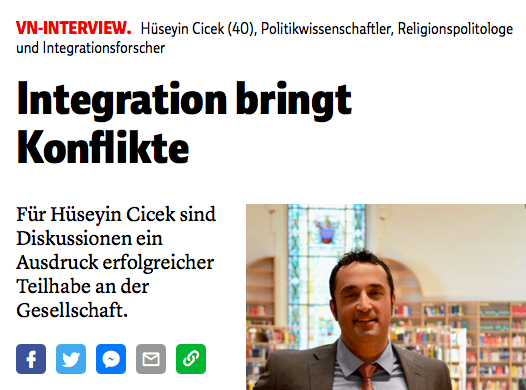Interview with Dr. Hüseyin Çiçek: Integration brings conflicts
Dr. Hüseyin Çiçek, political scientist and research associate at the EZIRE, defines discussions as an expression of successful participation in society in an interview with the Voralberger Nachrichten. Integration does not mean living together in harmony – it´s the contrary.
Many parts of the Turkish society in Vorarlberg are already well integrated and take part in society, according to Çiçek in the VN interview. Above all, clubs play an important role in all immigrant groups, since they are a piece of home and offer the opportunity to come together with like-minded people. Turkish clubs have taken on various social and political tasks and are also the mouthpiece of certain parts of the Turkish immigration society. In addition to many religious associations, there are some who are politically ideologically oriented.
Both in municipalities and at the state level, members of the clubs sit in various integration platforms, says Çiçek. They try to represent the interests of their association, but also to mediate between members of the association and politicians of the majority society – representatives of both sides could become either the accelerator or contain conflicts. A topic that is currently being discussed in the community, for example, is dual citizenship. While Austria has no problem with South Tyroleans, there is a lot of debate in the Turkish immigration society why this does not apply to them. Some say the Turks would not be accepted in the country, no matter what they did, others tried to smooth the waves.
The immigration society has become more visible through its participation in society – for example, the services sector is very much in the hands of immigrant groups. That is a positive change, a diversity, raising issues that were not on the agenda a few years ago.
For some, integration still means that immigrants assimilate, says Çiçek. For some that means, one is still regarded as if one were not to speak so far. Of course that’s not true. The problem is that one used to think that integration leads to harmony. But the opposite is the case, successful integration leads to tension with each other and to discussing controversial certain developments.
When possibly new founded Turkish parties move in the constitution and social order and represent the interests of people living in Austria, Çiçek sees this as part of successful integration. However, if an association or a party would come up with spongy utterances or argue in a situation-elastic way, then it would be a problem and one would have to look closely. In recent years, people have been focusing on language, many could participate in society by promoting language : this in turn does not only create harmony, when educating people about emancipation, they argue. These tensions must be sustained. To deal with extreme positions, you have to be vigilant and think about with whom to appear in public and who to invite to an integration advisory board. In order to do that, one has to be familiar with the immigration society and speak the language.
